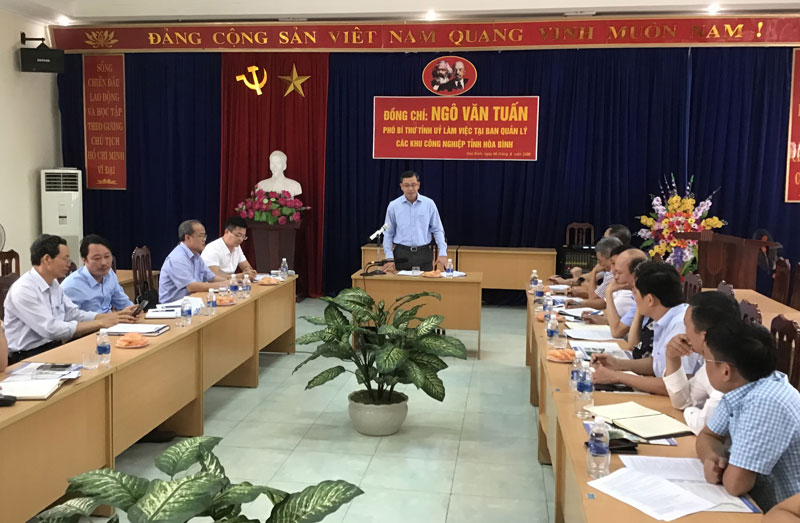
(HBO) - Vice Secretary of the Hoa Binh provincial Party Committee Ngo Van Tuan had a working session with representatives from the Management Board of Industrial Zones in the province on June 10. Leading officials of several departments and sectors also attended the meeting.

Vice Secretary of provincial
Party Committee Ngo Van Tuan speaks at the working session.
The province has eight
industrial zones which have been accepted by the Prime Minister to be added to
the Development Plan of Vietnamese Industrial Zones until 2015 with a vision to
2020. It approved the 1/500 detailed planning for these zones, with a combined
area of 1,507 hectares, including 978 hectares of industrial land. To date,
three out of the eight industrial zones, namely Luong Son, Da River’s Left Bank
and Yen Quang, have infrastructure investors. Four zones, namely Luong Son, Da
River’s Left Bank, Mong Hoa and Nam Luong Son, have attracted 95 projects,
including 24 FDI and 71 domestic ones, with a combined registered capital of
499.85 million USD and 7.27 trillion VND. Enterprises have created jobs for
thousands of labourers, and contributed importantly to the province’s
industrial development and import-export turnover.
Along with sharing
several difficulties, the Management Board of Industrial Zones made proposals
related to workforce, mechanisms, policies, and funds to serve management and
investment in development of industrial zones in the locality.
Speaking at the event,
Vice Secretary Tuan acknowledged and appreciated achievements gained by the
management board over the past years.
He asked the board to
make a report assessing and proposing measures to attract more investments in
industrial zones in the new tenure of the provincial Party Committee.
The board was
requested to well conduct planning and planning management, and ensure
infrastructure linkages in industrial zones.
Attention should be
paid to stepping up administrative reform, developing high-quality human
resources, protecting the environment, improving land clearance, choosing
competent infrastructure investors, proposing measures to attract more
investments, and helping enterprises deal with difficulties so as to promote
production and business.
On this occasion, Tuan
visited Coasia CM Vina Company in Luong Son Industrial Zone and Sankon Vietnam
Company in the Da River’s Left Bank Industrial Zone./.
The Standing Board of the Hoa Binh provincial Party Committee has agreed in principle on a proposal by the Standing Board of the Party Committee of Hoa Binh city to gather feedback on the city’s 1:2000 zoning plan, which forms part of its broader urban development strategy.
Hoa Binh province has made notable progress in public administration reform and digital government development, with the satisfaction index among citizens and businesses reaching over 84%, according to recent government evaluations.
Thanks to great efforts by local authorities in recent times, the governance and public administration performance of Mai Chau district has been significantly improved.
In the afternoon of June 6, the Party Committee, the People's Council, the People's Committee and the Fatherland Front of Lac Son district solemnly held a meeting to celebrate the 139th anniversary of the district's founding (1886–2025) and the 79th anniversary of the establishment of the district's Party Committee (1946–2025). There was the attendance of Mr. Bui Van Thang, the Vice Chairman of the Provincial People's Council; Mr. Quach Tat Liem, the Vice Chairman of the Provincial People's Committee; Ms. Dang Bich Ngoc, the Deputy Head of the National Assembly Delegation of the province; as well as the former leaders of the province and district through various periods, who are the natives of the district.
Implementing the Politburo’s Resolution No. 57-NQ/TW on breakthroughs in science – technology, innovation, and digital transformation is a golden opportunity for the northern mountainous province of Hoa Binh to renew growth model, improve competitive edge and shorten digital gap.
Resolution 57-NQ/TW, issued by the Politburo on December 22, 2024, identifies sci-tech, innovation, and digital transformation as strategic breakthroughs to build a developed and prosperous nation. In Hoa Binh province, this spirit is not just a slogan, it’s being put into action through concrete initiatives that form a "new development triangle”: digital citizenship, digital economy, and digital administration.



